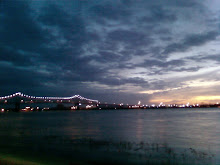Or so the arbiters of current planning practice would seem to believe given their undying passion toward "conservation" and environmental "best practices" to the exclusion of all else. Having spent much time in the belly of the development professions, I have witnessed forthwith that selfsame obsession which folks in that field hold toward preserving the natural environment, no matter the costs.
The desire to conserve natural resources is honorable and makes economic sense from time to time. But it is increasingly clear that the "in" thing to-day in city planning, GIS analysis, academic research, design engineering, architecture, and related fields is the overwhelming dictate of the political correctness of our age, to render development and human impacts on the environment "sustainable" and "eco-friendly" - and never mind the costs to the human lives for whom in their name this is all accomplished.
Never mind that human action will have some impact on the environment no matter what, as with any biological creation. Never mind that the environment is always in a flux of change, that species do come and go, that nature has a vast power to absorb the alterations which we effect upon it. Never mind that without anthropogenic environmental manipulation, civilization and all the comforts and benefits that spring from it would not be possible.
When men were close to the earth, life was nasty, brutish, and short. We should thank our "evil" developers and other risk-takers for increasing the quality of life manifold over the last few relatively free centuries (a fruitful era undergoing its death throes by Praetorian depredation as we speak).
It is apparent that the real issue here is not any fondness for the vaunted "quality of life" but indeed, an unhealthy affection for all that is natural which lies in direct opposition to the ability of individuals to pursue the business of their lives. Indeed, the root of the matter lies in a deep hatred for humanity, of all things made by man of productive value, a death wish to destroy human life in exchange for the betterment of fish, birds, and insects.
The death wish of primitivism indeed continues to engage the elites and serves as a professional gravy train for scores of budding dickheads who stake their careers in the exhilirating fields of "wildlife management" and "floodplain administration," needless to say within the confines of the eternally expanding public sector. The State as always looms large in all this, living up to its eternal reputation as enemy of humanity and existing in the service of itself, and consuming and destroying what human chattel stands in its way.
Decades ago the mission of urban planners, as misguided as any a profession to exist, was at least nominally aimed at human betterment, by shaping cities to meet the present and future needs of current and potential future residents. The business was about planning for future public services, expanding needed infrastructure, measuring out future requirements of human populations, and proposing solutions as needed. Now it appears that our vast reservoirs of urban despair, with all its problems of crime, poverty, undereducation, unemployment and underemployment, etc. are no match for the well-being of fish, trees, bugs, and water lilies when it comes to engaging the energies of our best and brightest urban policy makers.
This is a schizophrenic age above all else.



No comments:
Post a Comment